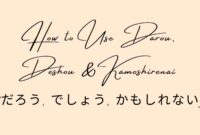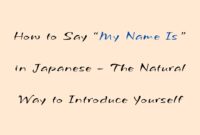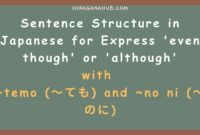Understanding Japanese Verbs: “Masu”, “Mashita”, “Masen”, and “Masen Deshita”

When you embark on a journey to learn Japanese, one of the first and most
important steps is mastering verb conjugations. The polite form of
verbs—”masu,” “mashita,” “masen,” and “masen deshita”—is essential for
building sentences, especially in formal settings. In this free lesson, we’ll
dive deep into these forms, helping you study and create natural sentences in
Japanese.
What is “Masu” (ます)?
“Masu” (ます) is the polite present or future tense form of Japanese verbs.
It’s used to describe actions happening now or in the future. For example:
- たべます (tabemasu) – “I eat” or “I will eat.”
- いきます (ikimasu) – “I go” or “I will go.”
Using “masu” makes your sentences sound polite and appropriate for most
situations, whether you’re speaking with someone new or in a formal setting
like a classroom or workplace.
What is “Mashita” (ました) ?
“Mashita” (ました) is the polite past tense form. It’s used when talking about
actions that have already happened. For example:
- たべました (tabemashita) – “I ate.”
- いきました (ikimashita) – “I went.”
This form is essential for sharing experiences or describing events in a
polite manner.
What is “Masen” (ません) ?
“Masen” (ません) is the polite negative present or future tense form. It’s
used to describe actions that don’t happen now or won’t happen in the future.
For example:
- たべません (tabemasen) – “I do not eat” or “I will not eat.”
- いきません (ikimasen) – “I do not go” or “I will not go.”
This form is perfect for politely declining or explaining what you don’t do.
What is “Masen Deshita” (ませんでした) ?
“Masen deshita” (ませんでした) is the polite negative past tense form. It’s
used to talk about actions that didn’t happen. For example:
- たべませんでした (tabemasen deshita) – “I did not eat.”
- いきませんでした (ikimasen deshita) – “I did not go.”
This form is very useful for conversations where you need to explain past
situations in a polite way.
Practical Examples and Sentences
Here are some examples to help you practice these forms and create your own
sentences:
- たべます (tabemasu)
-
わたしはまいにちごはんをたべます。
(Watashi wa mainichi gohan o tabemasu.) – “I eat rice every day.” - いきました (ikimashita)
-
こうがくかんにいきました。
(Kougakukan ni ikimashita.) – “I went to the museum.” - たべません (tabemasen)
-
わたしはにくをたべません。
(Watashi wa niku o tabemasen.) – “I do not eat meat.” - いきませんでした (ikimasen deshita)
- こうがくかんにいきませんでした。 (Kougakukan ni ikimasen deshita.) – “I did not go to the museum.”
By using these examples, you can begin to form a variety of sentences suitable
for everyday conversation.
Tips for Mastering Japanese Verbs
-
Practice Daily: Consistency is key when learning Japanese. Write sentences
or take an online class to reinforce what you’ve learned. -
Listen and Repeat: Watch Japanese lessons or listen to native speakers to
hear how these forms are used naturally. -
Use Flashcards: Study verb conjugations regularly to build a strong
foundation for speaking and writing.
Learning polite verb forms like “masu” and its variations is a vital step in
your Japanese language journey. With practice, these forms will become second
nature, allowing you to communicate effectively and respectfully. Take
advantage of free resources, study daily, and immerse yourself in the language
to see steady improvement.
Ready to continue your journey? Explore more free Japanese lessons online and
join a course or class that fits your schedule. Start today and make Japanese
a part of your daily life!


